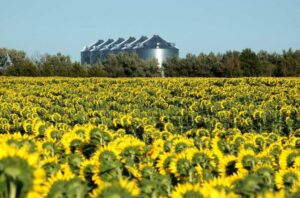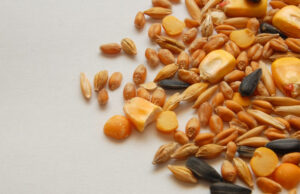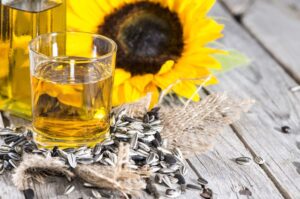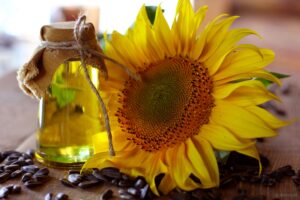
“Kernel, one of Ukraine’s largest agricultural holdings, processed 811 thsd tonnes of sunflower seeds in the second quarter of fiscal year (FY) 2024, up 24% year-on-year, when the company’s operations were disrupted by power outages due to Russia’s attacks on Ukraine’s energy infrastructure.
“Two out of eight plants of the agricultural holding, which are located in Kharkiv region near the border with Russia, remain unavailable for work,” the company said in a financial report on its website on Monday.
According to the report, sales of sunflower oil in the second quarter of FY2024 increased by 13% compared to the same period last year and exceeded 388 thousand tons. High volumes of sunflower seeds processing are supported by various export logistics options, including deep-water Ukrainian Black Sea ports. At the same time, sales of bottled sunflower oil accounted for 6% of total sales.
In the first half of FY2024, Kernel’s elevator volumes increased by 21% year-on-year to 2.5 mln tonnes as the agricultural holding managed to complete the harvesting campaign in its Agriculture division on time, unlike the postponed harvesting campaign a year earlier.
According to the agroholding, it managed to increase export transshipment volumes through its terminals by 11.2 times in October-December 2023, up to 1,805 thousand tons, using the temporary commercial shipping corridor created by the Ukrainian Navy. This volume includes transshipment of grain, sunflower oil and meal, as well as transshipment services provided to third parties (65 thousand tons in the second quarter of FY2024).
This figure, according to Kernel, is 5% higher than the same period last year and is explained by the success of the agricultural holding, which was achieved during FY2023 as part of the Black Sea Grain Initiative.
However, export terminals operated below pre-war levels as they suffered from damage caused by Russian missile strikes on Kernel’s port infrastructure in the summer of 2023.
Due to the resumption of transshipment volumes at the export terminal, the volume of grain exports from Ukraine in the second quarter of FY 2024 increased 8.4 times compared to the previous quarter, reaching 1.705 thousand tons, the agricultural holding stated.
As reported, before the war, Kernel was the world’s largest producer of sunflower oil (about 7% of world production) and its exports (about 12%). It is one of the largest producers and sellers of bottled oil in Ukraine. It is also engaged in the cultivation and sale of agricultural products.
In the first quarter of FY2024, the company posted a net loss of $30.9 million, while the previous year ended with a net profit of $162 million, with revenue down 17% to $564 million.

Bulgaria has authorized licensed imports of Ukrainian sunflower, rapeseed, corn and wheat, according to the website of the Ministry of Agriculture and Food of Bulgaria.
According to the report, during an online meeting on Friday, the Ministers of Agriculture of Bulgaria and Ukraine Kirill Vatev and Nikolay Solsky agreed to implement a licensed export regime for sunflower, rapeseed, corn and wheat seeds and agreed on the details of its application.
“The Ministry of Agriculture and Food has kept its promise to limit imports of these agricultural products as much as possible until November 30, according to the Memorandum signed between the government and the Initiative Committee of Protesting Farmers,” the Bulgarian ministry quoted Minister Vatev as saying.
He emphasized that after this period, the two countries will “strictly monitor that there are no market distortions and that the interests of Bulgarian producers, processors and consumers are not undermined.”
Imports and data exchange between the two countries will continue, the Bulgarian ministry emphasized.
As reported, in November 2023, the Minister of Agrarian Policy of Ukraine Solsky expressed the opinion that Bulgaria, which refrained from imposing a unilateral ban after September 15, could become the first frontline country to lift the ban on Ukrainian agricultural products.
In his opinion, the crop that Bulgaria will be ready to import from Ukraine will be sunflower. In Bulgaria, in the fall of 2023, a compromise was reached between farmers and processors to open the market for imports of Ukrainian sunflower from December 1. By this time, local sunflower oil producers, according to the Bulgarian government, will have to buy back the sunflower seeds produced by farmers, and they will need an additional 1.5 million tons of raw materials.
Earlier, Stepan Kapshuk, head of the industry association Ukroliyaprom, told Interfax-Ukraine that Bulgaria has 16 oil extraction plants that have significantly increased production in the 2022 season and intend to develop sunflower oil exports using sunflower seeds imported from Ukraine.
On September 15, the European Commission announced that it would not extend the restrictions on imports of agricultural products from Ukraine to five neighboring EU countries (Poland, Bulgaria, Hungary, Romania, and Slovakia) under certain conditions that will help avoid a new sharp increase in supplies.
The restrictions were introduced on May 2, 2023, and applied to imports of wheat, rapeseed, sunflower, and corn. These five Eastern European EU member states argued that Ukrainian agricultural products, when imported duty-free into the EU, were being deposited in their countries and were harming their local agricultural sectors.
After the restrictions were lifted, Poland, Hungary, and Slovakia imposed unilateral bans. Poland expanded its list of banned products to include rapeseed cake and meal, as well as corn bran, wheat flour, and derivatives. Hungary extended the list to 24 commodity items.
Ukraine filed a lawsuit with the WTO, accusing Poland, Hungary, and Slovakia of discriminatory treatment of its agricultural products.
Ukraine is currently negotiating a mechanism for licensing exports of Ukrainian agricultural products with mandatory verification in each of the five countries.

One of the largest grain market operators in Ukraine, JV Nibulon LLC (Mykolaiv), has signed an agreement with German agricultural machinery manufacturer HORSCH to purchase 13 seeders for sowing corn, rapeseed and sunflower at the AGRITECHNICA-2023 exhibition in Hannover.
“HORSCH Maestro seed drills are among the best and most technologically advanced on the sowing equipment market. They are convenient and productive, and their high sowing accuracy will allow us to perform operations efficiently and quickly at operating speeds of up to 15 km/h,” the company wrote on Facebook.
Nibulon explained its choice by the constant improvement of the machines by the manufacturer, testing on a production scale, including in Ukraine. In addition, HORSCH has a well-developed service base in Ukraine, which allows it to operate and maintain equipment with minimal downtime.
“We are striving to optimize our production processes and improve the quality and productivity of sowing to a new level,” Nibulon summarized and thanked HORSCH for its cooperation.
As reported, Nibulon also signed an agreement to purchase 29 agricultural machines with German agricultural machinery manufacturer CLAAS at AGRITECHNICA-2023. It is planned that 10 combines, 15 tractors and 4 telescopic loaders will be used for crop production in the 2024 season.
Nibulon JV LLC was established in 1991. Prior to the Russian military invasion, the grain trader had 27 transshipment terminals and crop reception complexes, a one-time storage capacity of 2.25 million tons of agricultural products, a fleet of 83 vessels (including 23 tugs), and owned the Mykolaiv Shipyard.
“Before the war, Nibulon cultivated 82 thousand hectares of land in 12 regions of Ukraine and exported agricultural products to more than 70 countries.
In 2021, the grain trader exported the highest ever 5.64 million tons of agricultural products, reaching record volumes of supplies to foreign markets in August – 0.7 million tons, in the fourth quarter – 1.88 million tons, and in the second half of the year – 3.71 million tons.
Nibulon’s losses from Russia’s full-scale military invasion reached $400 million. The grain trader is currently operating at 30% of capacity and has set up a special unit to clear agricultural land of mines.

The farms of KSG Agro have completed the sunflower harvesting campaign on an area of 7,360 hectares with a yield of 24 c/ha, the press service of the agricultural holding reported.
“The results of the harvesting campaign are positive for us, thanks to weather conditions with sufficient rainfall. We predicted a final yield of 23-25 cwt/ha, but in fact we got 24 cwt/ha. This year’s harvesting campaign was delayed because we partially used seeds with a late maturity. We should also mention the results of Apostolivske branch, which for the first time since it joined the holding achieved high sunflower yields of 24.5 c/ha,” said Dmytro Emelchenko, Head of the company’s crop production division, as quoted in the press release.
According to him, in parallel with the sunflower harvesting campaign, the holding’s farms sowed winter wheat on an area of 2 thou hectares and rapeseed on an area of 1.5 thou hectares.
“The peculiarity of this year’s winter crops was that due to weather conditions we sowed almost dry. Nevertheless, the seedlings received at the end of October are in satisfactory good condition,” said Mr. Yemelchenko.
KSG Agro, a vertically integrated holding company, is engaged in pig production, as well as the production, storage, processing and sale of grains and oilseeds. Its land bank is about 21 thousand hectares in Dnipropetrovska and Kherson regions.
According to the agricultural holding, it is one of the top 5 pork producers in Ukraine.
Last year, due to the full-scale war launched by Russia, KSG Agro ended with a net loss of $1.68 million compared to $17.71 million in net profit in 2021, its EBITDA decreased 5.5 times to $1.79 million, and revenue decreased by 47.3% to $16.2 million.
In the first quarter of 2023, the agricultural holding earned $1.53 million in net profit, which is 17% less than in the same period last year. Its EBITDA increased by 23% to $1.87 million and revenue by 45% to $5.12 million.

“Kernel, one of the largest Ukrainian agro-industrial groups, processed 610 thousand tons of sunflower and rapeseed at its oil extraction plants in the first quarter of the 2023/24 fiscal year (FY, July 2023 – June 2024), down 5% year-on-year.
“Due to the seasonal shortage of sunflower seeds at the end of the processing season (the new harvest will be in September-October 2023), the Group switched to rapeseed processing at two of its plants, processing 112 thousand tons for the three months ended September 30, 2023,” the company said in its financial report posted on its website over the weekend.
According to the report, the volume of edible oil sales in the first quarter of 2023/24 FY increased by 16% compared to the previous quarter and amounted to 369 thsd tonnes, including 20 thsd tonnes of bottled sunflower oil and 19 thsd tonnes of rapeseed oil.
In addition, the increase in yields and the increase in acreage under wheat, sunflower and soybeans harvested by Kernel’s agricultural enterprises, according to the data for the 1st quarter of 2023/24 fiscal year, led to an increase in the volumes received for storage at the group’s elevators to 1.208 million tons, which is 2.3 times more than a year earlier.
The agroholding noted that due to the termination of the Black Sea Grain Initiative on July 18, 2023, the throughput capacity of Kernel’s export terminals in Ukraine decreased significantly to 162 thsd tonnes in the first quarter of 2023/24, which is 83% less than in the previous quarter. Half of the exported agri-goods were shipped through Kernel’s infrastructure facilities in the port of Reni on the Danube.
Ukraine exported 203 thsd tonnes of grain in the first quarter of 2023/24, down 68% quarter-on-quarter. Most of the grain was exported via Ukrainian ports on the Danube and by rail to the Romanian port of Constanta, as Kernel’s usual export routes – Ukrainian Black Sea ports – were unavailable for export operations due to Russia’s unilateral termination of the Black Sea Grain Initiative in July 2023, the financial report says.
According to the agroholding, alternative export channels for Ukrainian agricultural products lead to high logistics costs, which, against the backdrop of low global grain prices, lead to a reduction in exports.
In this regard, Kernel has made significant changes to the structure of crops grown to minimize the area under the most energy-intensive and logistically complex crops (grains and corn) in favor of less energy-intensive soybeans and wheat.
As of September 30, the agronomic division completed the harvest of wheat, sunflower and soybeans on 61 thou hectares, 119.8 thou hectares and 65 thou hectares, respectively. The yields of all crops were better than expected due to favorable weather conditions and amounted to 6.7 t/ha of wheat, 2.9 t/ha of sunflower, and 2.9 t/ha of soybeans.
Corn harvesting from 84.4 thou hectares is still ongoing. Approximately half of the area has not yet been harvested. As a result of the harvesting campaign, Kernel expects to achieve a corn yield of 9.5 tons per hectare.
Prior to the war, Kernel was the world’s largest producer of sunflower oil (about 7% of global production) and a major exporter (about 12%). It is one of the largest producers and sellers of bottled oil in Ukraine. It is also engaged in the cultivation and sale of agricultural products.
Kernel’s net profit for FY2023 amounted to $299 million, while the previous year it ended with a net loss of $41 million. The agricultural holding’s revenue for FY2023 decreased by 35% to $3.455 billion, but EBITDA increased 2.5 times to $544 million.

In 2022-2023 marketing year (MY), the planted area and production of high-oleic sunflower in Ukraine were the lowest in recent years.
According to the analytical agency UkrAgroConsult, in 2023-2024 MY the planted area is expected to increase slightly, but the production figures will remain extremely low.
“Before the war, the processing of high oleic sunflower reached almost 500 thsd tonnes, which is a good result for such a niche segment. Unfortunately, due to the war, Ukraine has lost both the results gained over the years and its share in the global high-oleic oil market,” the analysts stated.
They noted that high oleic oil remains an export-oriented commodity and almost all of it is exported.
The key issues remain the war, instability in the grain corridor and the ban on imports of agricultural products from Ukraine to Eastern Europe, which will affect the market of high-oleic sunflower, the experts emphasized.
However, according to analysts, the main factor limiting the expansion of the area under high-oleic sunflower in Ukraine is the unstable margin for agricultural producers.
“Sometimes low or no premium entails selling high-oleic seeds at the price of conventional raw materials, which does not always cover the cost of production. This leads to the refusal of agricultural producers to grow this type of sunflower or to reduce the area,” UkrAgroConsult emphasized.
The analysts reminded that before the war, the crushers encouraged farmers to grow high oleic sunflower: they offered to enter into forward agreements, provided seeds for growing with the subsequent purchase of raw materials with a premium.
“Starting from 2023-2024 MY, Ukraine will see a gradual resumption of high-oleic sunflower processing and oil refining, but it is still far from reaching the pre-war levels,” UkrAgroConsult summarized.